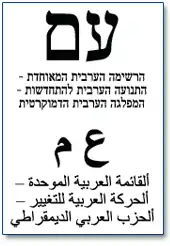United Arab List
The United Arab List (Hebrew: הַרְשִׁימָה הַעֲרָבִית הַמְאוּחֶדֶת, HaReshima HaAravit HaMe'uhedet; Arabic: القائمة العربية الموحدة, al-Qā'ima al-'Arabiyya al-Muwaḥḥada), commonly known in Israel by its Hebrew acronym Ra'am (Hebrew: רע"מ, lit. 'Thunder'), is an Arab political party in Israel, and the political wing of the Southern Branch of the Islamic movement.[5] Though it was part of the Joint List, it left the alliance on 28 January 2021.[6]
United Arab List הרשימה הערבית המאוחדת القائمة العربية الموحدة | |
|---|---|
 | |
| Leader | Mansour Abbas |
| Chairman | Mansour Abbas |
| Founded | 1996 |
| Ideology | Israeli Arab interests Two-state solution Anti-Zionism Islamism[1][2][3] Social conservatism[4] |
| Political position | Big tent |
| National affiliation | Joint List (2015–2019; 2020–2021) |
| Seats in Knesset | 4 / 120 |
| Most MKs | 5 (1999) |
| Election symbol | |
| עם ع م | |
History

The party was established prior to the 1996 elections, unrelated to the original United Arab List that existed in the late 1970s and early 1980s. It was joined in an electoral alliance by the Arab Democratic Party (which held two seats in the outgoing parliament) and the southern faction of the Islamic Movement. The party initially went under the title of Mada-Ra'am, Mada being the acronym and common name for the Arab Democratic Party. In the elections, the party won four seats. During the Knesset term, the Arab Democratic Party became a faction within the United Arab List, and its name was dropped from the party title.
The next elections saw the party increase its share of the vote and pick up five seats. However, internal disagreements saw three MKs leave; Muhamad Kanan and Tawfik Khatib left and established the Arab National Party, whilst Hashem Mahameed formed the National Unity – National Progressive Alliance party. In the 2003 elections the party's support dropped by more than a third, with the party only just crossing the electoral threshold of 2%, and winning only two seats.
For the 2006 elections the party entered an alliance with Ahmad Tibi's Ta'al party. Running together, the alliance won four seats, three of which were taken by the United Arab List. The partys' alliance was maintained for the 2009 elections, which initially saw the Israeli Central Elections Committee ban the party from participating,[7] but this was overturned by the Supreme Court of Israel.[8] In the elections, the alliance again won four seats. Shortly before the 2013 elections, Taleb el-Sana left the party to sit as an independent Arab Democratic Party member.
After the electoral threshold to gain Knesset seats was raised from 2% to 3.25%, the party joined with Hadash, Balad, Ta'al, and the Islamic Movement to form the Joint List for the 2015 election.[9] For the April 2019 election, it is ran on a list with Balad.[10] The party again ran as part of the Joint List in the 2020 election.[11]
Ideology and support
The party supports the two-state solution, and the creation of a Palestinian State in the West Bank and Gaza Strip, with East Jerusalem as its capital; and equal rights for Arab citizens of Israel.
Its constituency consists mostly of religious or nationalist Israeli Arabs, and enjoys particular popularity among the Bedouin – in the 2009 elections, 80% of residents of Bedouin communities voted for the party.[12] The Islamic Movement also operates in poor Arab towns and villages, as well as in Bedouin settlements, to mobilize voters. The southern faction of the Islamic Movement is now the dominant force in the party, whilst other factions include the Arab National Party.
Knesset membership
Current Knesset members
Former Knesset members
- Taleb el-Sana (1996–2012)
- Abdulmalik Dehamshe (1996–2006)
- Muhamad Kanan (1999–2001)
- Tawfik Khatib (1996–2001)
- Hashem Mahameed (1999–2002)
- Ibrahim Sarsur (2006–2019)
- Masud Ghnaim (2009–2019)
- Taleb Abu Arar (2013–2019)
- Abd al-Hakim Hajj Yahya (2019–2020)
See also
References
- Carol Migdalovitz (18 May 2015). "Israel: Background and Relations with the United States" (PDF). CRS Issue Brief for Congress. Congressional Research Service. Retrieved 15 June 2015.
- Rubin, Barry (2012). Israel: An Introduction. Yale University Press. p. 219. ISBN 978-0300162301.
- Freedman, Robert O., ed. (2008). Contemporary Israel: Domestic Politics, Foreign Policy, and Security Challenges. Westview Press. p. 14. ISBN 978-0813343853.
- Ahlswede, Stefan (2009). Israel's European Policy After the Cold War. Nomos. p. 47.
- The Arab Minority in Israel and the Knesset Elections The Washington Institute
- Staff writer; Aaron Boxerman (28 January 2021). "Knesset panel approves Joint List's breakup after talks with Ra'am faction fail". The Times of Israel.
- "Israel bans Arab parties from running in upcoming elections". Haaretz. 12 January 2009. Retrieved 15 June 2015.
- Sharon Roffe-Ofir (21 January 2009). "Hadash praises verdict on Arab parties". Ynetnews. Retrieved 15 June 2015.
- Hazboun, Areej; Estrin, Daniel (28 January 2015). "As Arab MKs unite, a new political landscape emerges". The Times of Israel. Retrieved 15 June 2015.
- "FULL LIST: The Parties and Candidates Running in Israel's Election". Haaretz. 20 February 2019. Retrieved 23 February 2019.
- Rasgon, Adam (3 March 2020). "Headed for 15 seats, Joint List chief claims 'huge' success, cites Jewish voters". The Times of Israel. Retrieved 28 January 2021.
- "How They Voted: See Israel election results by city/sector". Haaretz. 17 February 2009. Retrieved 15 June 2015.
External links
- Islamic Movement (in Arabic)
- United Arab List Knesset website
- Mada-Ra'am Knesset website
- Ra'am-Ta'al Knesset website